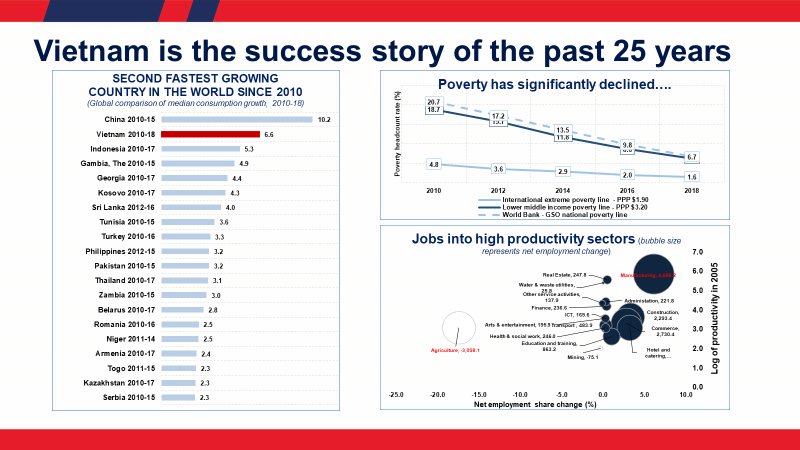Similarities between Cristiano Ronaldo and Vietnam
Vietnam could achieve its ambition of becoming a high-income country in 2045 by adapting its development strategy toward higher efficiency, just like Cristiano Ronaldo did with his game at the age of 35.
Just like what Cristiano Ronaldo means for the football community, Vietnam is also considered a star in the world of economic development, according to Jacques Morisset, lead economist at the World Bank in Vietnam.
| Cristiano Ronaldo means for the football community, Vietnam is also considered a star in the world of economic development. |
When playing for Manchester United, the well-known professional soccer player was able to run throughout the entire field, dribbling past several players and scoring. Now, aged 35, he can still score three goals in a decisive game because he learned to be in the right place at the right time. Ronaldo has remained one of the world’s top soccer players by adapting to his ability and adjusting to the match he plays.
Meanwhile, Vietnam remained the second fastest growing economy for the past decade, but it has also managed to almost eradicate extreme poverty, taking it from 53% in 1992 to less than 2% in 2018, stated Morisset in its article for Brookings.
Such remarkable performance was achieved mainly because the economy was running fast, just like the young Ronaldo at the peak of his physical strength. The country’s population was young and dynamic, eager to learn and work; and production was pushed by the tailwinds of globalization and structural transformation.
Morisset said that Vietnam’s smart policy management has extended to the Covid-19 pandemic, so much so that Vietnam is now projected to remain one of the world’s fastest growing countries in 2020.
| Source: World Bank. |
Looking ahead, like Ronaldo at 35, Vietnam’s economy may find it harder to run faster. Many of its traditional drivers of growth have started to slow down and are expected to decline further in the future.
The so-called demographic dividend is fading as an aging population is looming on the horizon. The export drive might be more difficult to sustain in a world that has been increasingly closing its doors—as reflected by lower global trade and capital movements. The automation of industrial processes may lead to the reshoring of activities that were attracted to Vietnam’s cheap labor. By running so fast, Vietnam has become more vulnerable to environmental risks and seen some of its most beautiful assets deteriorating, such as the Mekong delta and its forests. Cities in Vietnam are also becoming heavily polluted.
Morisset expected Vietnam to put efficiency at the front and center of its development strategy. The country should learn not only to grow fast, but also better. This will require smart management of the country’s wealth by making firms more dynamic, infrastructure more efficient, workers more skilled, and the environment more resilient to human activities and climate change.
Beyond the conventional but important recommendations to improve technology diffusion—including through the development of a digital economy and strengthening labor skills—it requires a change in mindset, he said.
To achieve sustainable development, Morisset suggested Vietnam focus less on increasing production outputs but more on the optimal allocation of financial and human resources to the most dynamic firms.
This includes a reduction in the barriers of entry to new investors, which are high in some sectors, and allow the least performing businesses to exit by modernizing the existing insolvency framework.
Second, the government should shift from encouraging access to basic infrastructure services to incentivizing responsible behaviors. As most Vietnamese now have access to these services, the pricing strategy should be to adjust tariffs with supply costs to increase efficiency as well as to reduce waste and pollution.
The World Bank’s expert, however, said the country should implement such policy in a smart and gradual way to protect vulnerable groups.
As Morisset said Ronaldo has maintained his high performance by adjusting his approach to the game. Vietnam’s ambition to become a high-income country by 2045, would also be achievable if it starts adapting the development strategy toward higher efficiency, he concluded.













